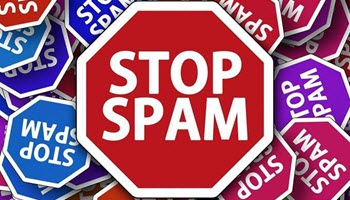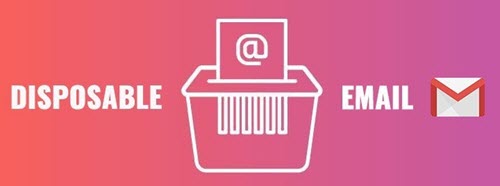Email spam is the bane of every computer user’s life and is difficult to avoid. However, understanding how spammers get hold of your email address in the first place can help at least minimize the risks. Here then are a number of steps you can take to help protect your email address from spammers:
#1 Use The Bcc Line For Multiple Recipients
All email clients include three options for inserting recipient’s email addresses:
- To: Plainly visible for all to see
- Cc: Also plainly visible for all to see
- Bcc: Not visible to other recipients
If you are sending email to multiple recipients, always use the Bcc line whenever possible. And, if you’re forwarding email that’s been sent to multiple recipients using the To and/or Cc lines, delete all those original email addresses from your forwarded email prior to hitting that Send button. Otherwise, it only needs one of those multiple email addresses to have been compromised to put every recipient at risk.
#2 Don’t Publicize Your Email Address
Spammers and scammers utilize web-crawling “spiders” (or bots) dedicated to seeking out email addresses posted on public platforms. You do not see any sign of these spiders but be assured they are swiftly and incessantly crawling the web looking for tell-tale signs of email addresses, which is often the common “@” symbol.
Do NOT post your email address on any public platforms, such as forums or personal web pages. If you’re in a situation where you must communicate your email address publicly, you should replace the characters commonly found in email addresses with the corresponding words to mitigate the risk. For example; if your email address is johnsmith21@gmail.com post it as johnsmith21atgmaildotcom.
#3 Do Not Reply To Spam
Spammers are a cunning lot and another common form of collecting email addresses is via “blind dictionary attacks” which utilize a combination of common words with popular domain names to generate millions of email addresses. Even though the vast majority of these computer-generated email addresses are not valid, spammers are prepared to accept a massive bounce rate in order to get their hands on just a handful of genuine email addresses. That’s why it is very important that you do NOT reply to spam. By doing so, you are merely confirming an “active” email address and inviting more spam.
You can mitigate the risks of dictionary attacks by avoiding simple, easy-to-guess email addresses. Unfortunately, it is a fairly common practice among users to choose email addresses that include dictionary words, common first or last names, followed by a string of numbers. Many users are under the impression that adding a string of numbers will help safeguard the email address, it will not. Email addresses such as jenny1234@gmail.com or johnstone1952@outlook.com are ripe for a dictionary attack.
#4 Use Disposable Email Addresses
If you need to provide an email address to enter a contest for a chance to win some prize you just can’t resist, or to download free software or some other promised freebie, do NOT use your real email address. There are a number of online services that provide disposable email addresses for free and, in most cases, they are very simple to use. Check out SimpleLogin
- Also check out: Anti-Spam: Disposable Email Addresses from Spamgourmet
#5 Check That Privacy Policy
If you are submitting your email address to sign up for a mailing list (such as a newsletter), make sure to check the privacy policy first to see how your email address might be shared and with whom. Here is an excerpt from our own privacy policy as an example:
Privacy: Your privacy is of the utmost importance to us. We value our privacy and will respect yours. We collect only basic information such as first names and email addresses. We will not share, sell, or give your information to any third party, nor will we use your email address for spam.
If the privacy policy states otherwise, see if you can opt-out of allowing your email address to be shared with any third parties. If there is no way to opt-out of sharing, I would suggest not signing up.
BOTTOM LINE:
In the end, it’s nigh on impossible to avoid spam altogether. However, by following the above steps, and encouraging your friends and family to do the same, you can at least limit your exposure and, hopefully, keep much of the spam at bay.
- You might also like: Have You Stopped Answering The Phone?




Jim……I agree with all your points but is not my email address essentially public information?
Hey Marv,
Absolutely not, quite the opposite. Email addresses are initially unique and private and only become known/identified through bad practices… as described in the article.
My first real exposure to email and the internet was in business, and a lot of advice I see stated online just wouldn’t hold in the business world. Clearly, we don’t try to disguise our addresses in the business environment where it’s most likely to be some combination of our real names or initials along with the domain name.
So I approach the handling of my personal address in much the same open-minded way as my business addresses and yet I’m hardly ever the recipient of spam.
About Bcc:, I know Gmail tends to see red flags when users do this, and the messages may not be delivered to recipients due to suspicion of Spam activity. Personally, I’m likely to reject a message if it reaches me via a method that shows “undisclosed recipients”, or doesn’t display my name anywhere in the address lines.
Hey Tony,
Appreciate what you are saying, however, the article is aimed at home users not businesses.
Yes, some email clients can mark email as spam if there are a lot of addresses in the Bcc line but, again, this applies mainly to businesses where very large numbers of multiple recipients are involved.